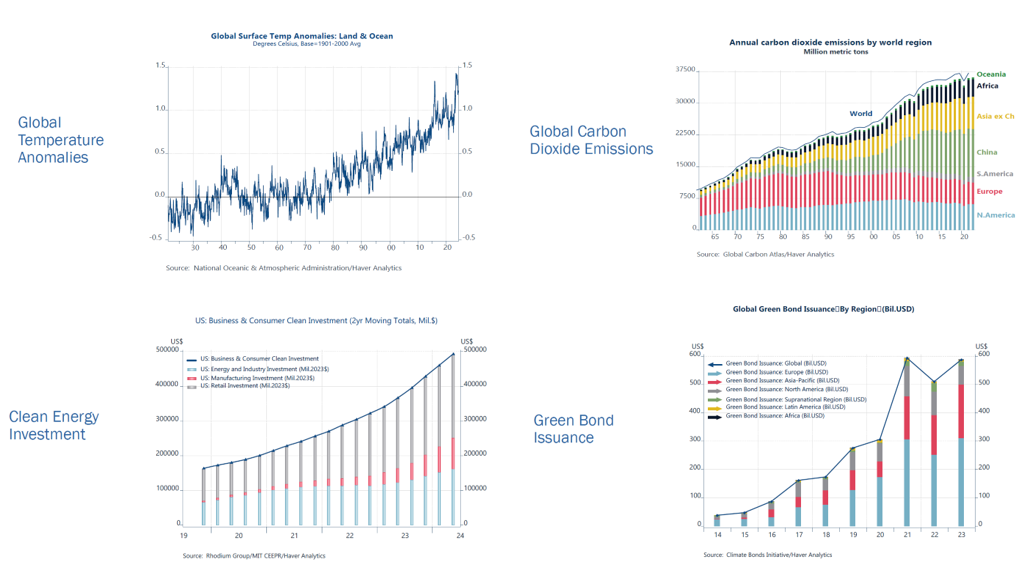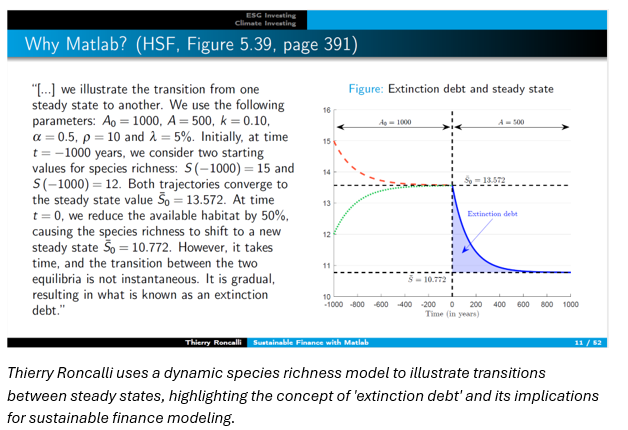Modeling Carbon Emissions: An Econometric Approach
In a recent webinar hosted by MathWorks, we were joined by Andy Cates, a senior economist at Haver Analytics, one of our Data Provider Partners. Sofia Ma, a senior engineer from MathWorks, and Andy covered the intersection of climate change, the energy transition, and advanced econometric modeling. This session highlighted the critical role of data and sophisticated analytical tools in understanding and addressing climate-related challenges. This blog post discusses some of the key topics covered during the webinar.
You can watch a recording of the webinar below:
and review the slides here:
Climate Change and Energy Transition
Andy Cates opened the webinar by emphasizing the implications of climate change and the ongoing energy transition on the global economy. The economic landscape is being reshaped by factors such as extreme weather events, resource scarcity, and biodiversity loss. However, these challenges also present unique economic opportunities. The shift from fossil fuels to renewable energy sources is not only essential for mitigating climate change but also serves as a catalyst for economic growth, job creation, and innovation. Emerging green technologies are paving new paths for investment and development.

Harnessing the Power of MATLAB
Sophia Ma then took the stage to demonstrate the extensive capabilities of MATLAB in econometric modeling, particularly in forecasting carbon emissions. By integrating Haver Analytics’ VG3 software with MATLAB, researchers can significantly enhance their research capabilities. MathWorks’ Econometrics Toolbox and advanced state-space modeling techniques offer a powerful suite of tools for conducting sophisticated analyses.
Sofia demonstrated two models: a basic State-Space Model and an advanced Bayesian Nonlinear Non-Gaussian State-Space Model for estimating global carbon emissions. She also presented the workflow through an intuitive, easy-to-create App, showcasing the underlying code in the form of a live script that allows users to easily adjust model assumptions and parameters.

A Collaborative Effort for Sustainable Goals
The collaboration between Haver Analytics and MathWorks exemplifies how data-driven approaches can aid in climate change mitigation and support the energy transition. By empowering analysts and policymakers with the tools to track progress, identify trends, and make informed decisions, this partnership aims to contribute to achieving sustainable economic and climate-related goals.
MathWorks has developed connectors to various Haver Analytics products, including HaverView as well as DLX Direct which are shipped with the Datafeed Toolbox and documentation for which can be found at the links below:
https://www.mathworks.com/help/datafeed/haverview.html
https://www.mathworks.com/help/datafeed/haverdirect.html
The webinar underscored the importance of leveraging advanced data analytics to address the multifaceted challenges posed by climate change. As Andy concluded, the collaboration between Haver Analytics and MathWorks is a step towards empowering stakeholders to make data-driven decisions critical for a sustainable future.
If you’d like to learn more about the work MathWorks is doing in the field of Climate Finance or need help with work you’re doing in this space, feel free to reach out to us at: climatefinance@mathworks.com
- Category:
- Climate Finance








Comments
To leave a comment, please click here to sign in to your MathWorks Account or create a new one.